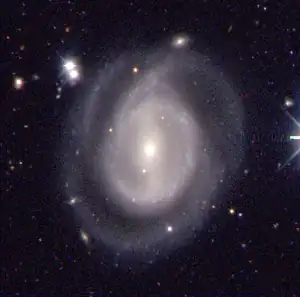| NGC 53 | |
|---|---|
 DECam image of NGC 53 and nearby stars | |
| Observation data (2000.0 epoch) | |
| Constellation | Tucana[1] |
| Right ascension | 00h 14m 41.8s [1] |
| Declination | −60° 19′ 39″ |
| Redshift | 0.015237 ± 0.000087[2] |
| Heliocentric radial velocity | 4570 km/s |
| Distance | 200,000,000ly[3] (65,000,000 Parsecs)[4] |
| Apparent magnitude (V) | 13.50 [5] |
| Characteristics | |
| Type | (R)SB(r)ab [3] |
| Size | 120,000 light years[3] |
| Apparent size (V) | 1.698′ × 1.047′ [6] |
| Other designations | |
| PGC 982[6] ESO 111- G 020 ESO 001215-6036.4 AM 0012-603 FAIRALL 3 2MASX J00144279-6019425 IRAS F00122-6036 SGC 01215-6036.4 ESO-LV 1110200 2MIG 25 6dF J0014427-601942 6dF J0014428-601942 APMBGC 111-079+028 APMUKS(BJ) B001216.14-603622.4 [2] | |
NGC 53 is a ringed barred spiral galaxy in the constellation Tucana.[1] It was discovered by John Herschel on 15 September 1836.[3] He described it as "very faint, small, extended".[3] The galaxy is approximately 120,000 light-years across, making it about as large as the Milky Way.[3]
See also
References
- 1 2 3 "Category:NGC 53 - Wikimedia commons". Retrieved 2013-08-23.
- 1 2 "NED search results for NGC 53". Retrieved 2013-08-23.
- 1 2 3 4 5 6 "New General Catalog Objects: NGC 50 - 99". Retrieved 2013-08-23.
- ↑ "parsecs to lightyears conversion". Retrieved 2013-08-23.
- ↑ "NGC 53 » Deep Sky Objects Browser". Archived from the original on 2014-12-06. Retrieved 2013-08-23.
- 1 2 "NGC 53 - Galaxy - WIKISKY". Retrieved 2013-08-23.
External links
 Media related to NGC 53 at Wikimedia Commons
Media related to NGC 53 at Wikimedia Commons- NGC 53 on WikiSky: DSS2, SDSS, GALEX, IRAS, Hydrogen α, X-Ray, Astrophoto, Sky Map, Articles and images
- SEDS
This article is issued from Wikipedia. The text is licensed under Creative Commons - Attribution - Sharealike. Additional terms may apply for the media files.